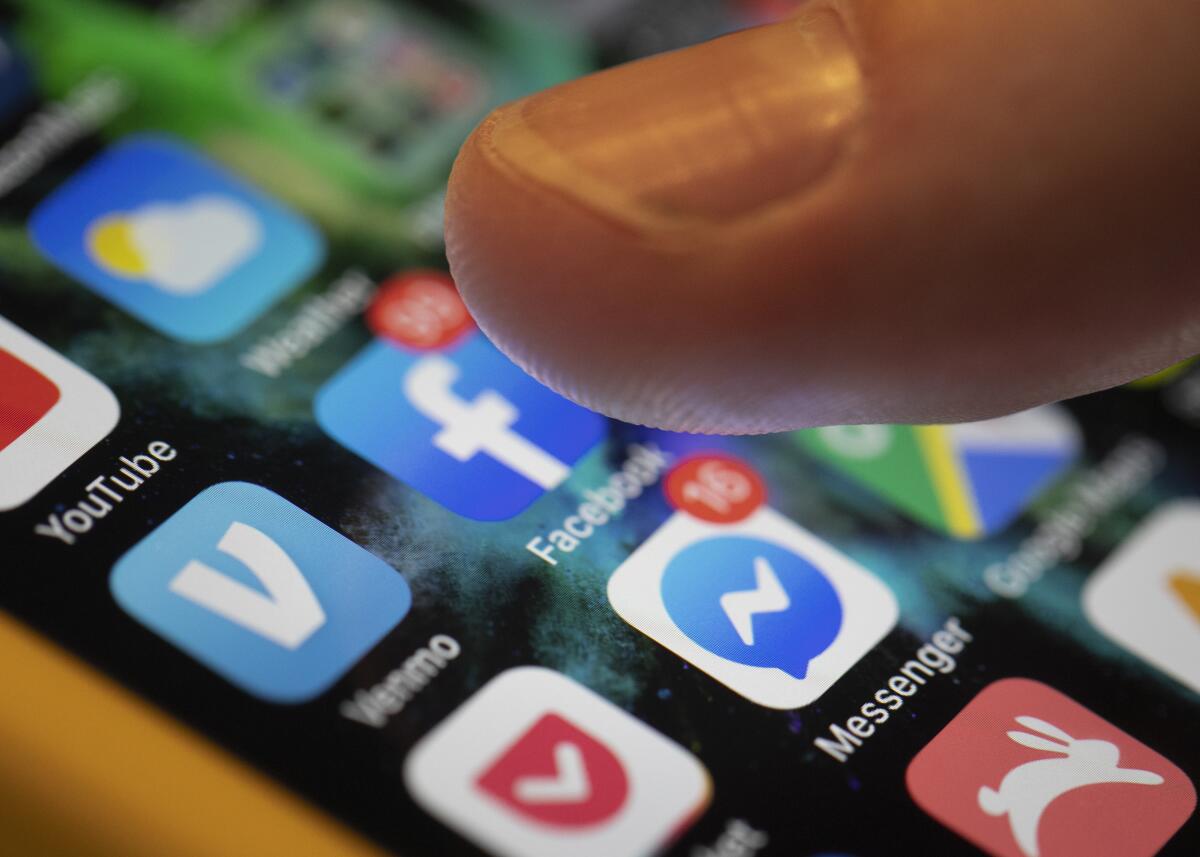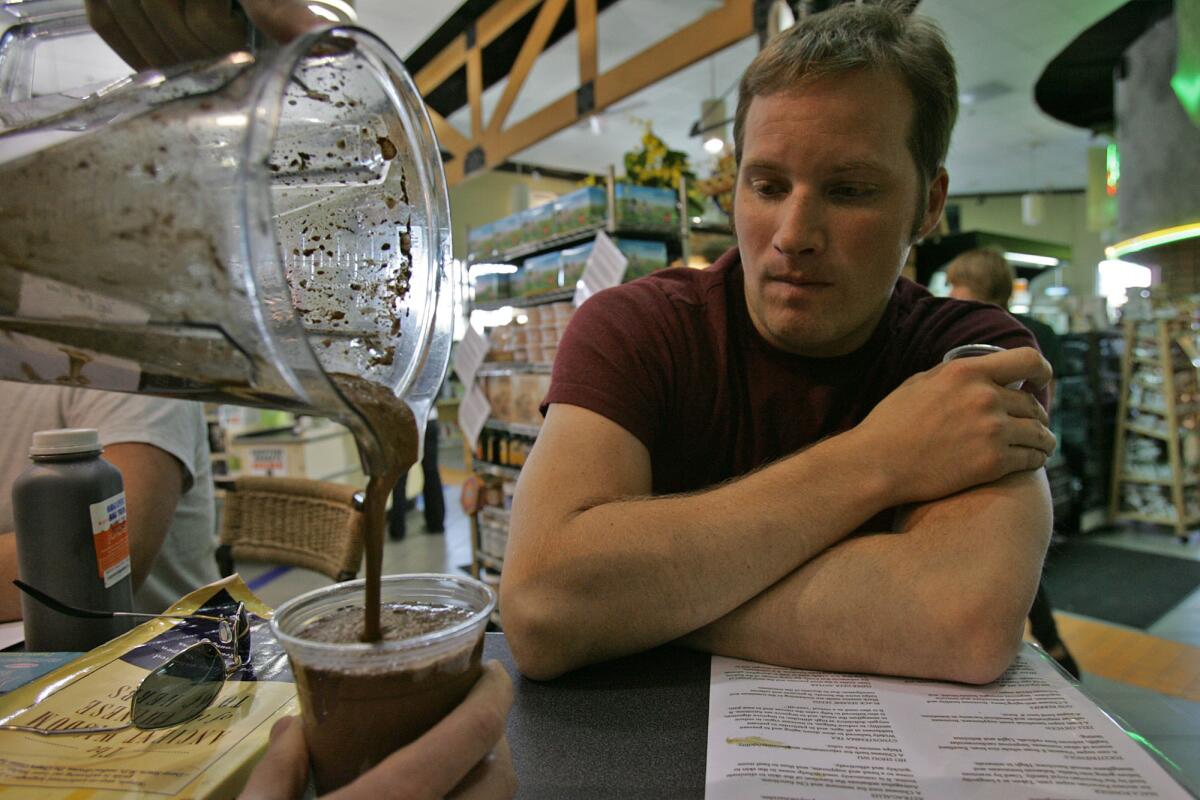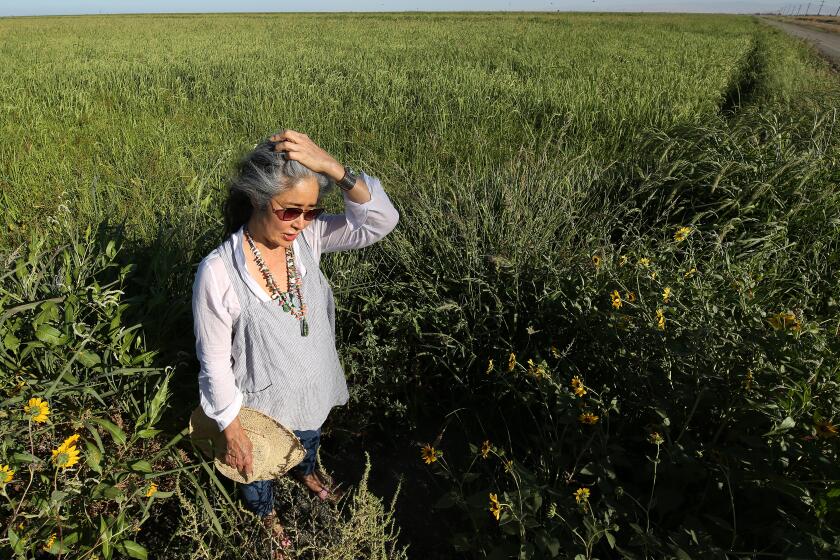We’re thoughtful about what we eat. How come we’re thoughtless about what we share online?

- Share via
Recently I went to Erewhon for the first time, and I found myself fantasizing about a better future for the internet.
If you’ve never been, I highly recommend it. Erewhon is a health food store founded by a Japanese couple in Boston that was later reborn as a higher-than-high-end grocery and cafe with five locations across Los Angeles. It’s the Whole Foods for people who think Whole Foods is a dump.
Shoppers, many of whom are celebrities or at least good-looking enough to be one, may be seen taking Irish moss as a blood purifier and considering gin’s effect on the skin. You can spend $20 on a smoothie here, presumably because it comes with medium-chain triglycerides, collagen, lucuma, and a coffee substitute called Dandy Blend (presumably because those things are good for you in some way).
I’m kidding. I really didn’t come here to mock. Actually, I feel real admiration for this place, because Erewhon is a testament to how much we care about what goes into our bodies and how much we’re willing to spend on it.
I find its customers to be dedicated, determined and disciplined. How much research do you have to do before you spend $8 on a soy-free, sugar-free, gluten-free, GMO-free, vegan-ketogenic-paleo chocolate with adaptogenic herbs? When I went there last week, several people waited in long lines to purchase boxes that each appeared to contain exactly three roasted portabello mushrooms.
Frankly, I’m jealous of customers like these. We could use them in the journalism industry. At Erewhon, the gulf between how thoughtful we are about food and how thoughtless we are about information yawns painfully wide.

At Erewhon the “alchemists” at the tonic bar prepare “Liver Love” and “Health Works” juice shots. But on Facebook, some of my friends will casually re-share and then fiercely debate “facts” from uploaded JPEG files edited in Microsoft Paint — which is kind of like the informational equivalent of eating an already-opened bag of Hot Cheetos you found in a dark alley, then offering it to everyone you care about without checking to see if there are maggots squirming inside.
When I’ve confronted those friends — intelligent and thoughtful save for their tendency to share fake articles — their defense often goes something like “Yeah, but this is Facebook, where dumb stuff happens.”
And there’s truth in that. There is something about the internet that makes us act dumb, and that includes me.
I’m a journalist who tries to be specific about what I click. But when I examine my memories, I do find disturbing and embarrassing holes in my knowledge.
“At Erewhon, the gulf between how thoughtful we are about food and how thoughtless we are about information yawns painfully wide.”
— Frank Shyong
Was there really a mural wall on Melrose that could only be used by influencers with more than 20,000 followers? Did that guy on Twitter really steal a brick of heroin from MS-13 and sell it? Is Martin Lawrence dead? (No, no and no, thank God. “Bad Boys 3” is safe.)
Social media has such a direct path to our emotions that we sometimes forget that these are commercial information platforms whose primary purpose is to harvest our attention and information and sell it to anyone who will buy it, said Safiya Umoja Noble, a professor at UCLA who studies digital media and society.
Interactions on social platforms are addictive signals designed to work on brain chemistry, undermine rational thinking and increase the rate at which you click, comment, favorite, like, or otherwise interact with the platform.
Over time, we’re conditioned to accept “a set of public spheres that are increasingly being acculturated to the most fantastical and most egregious,” Noble said.
We tend to assume social media platforms are neutral when in fact they are heavily biased towards the controversial, lurid or partisan content that tends to spark our engagement, Noble said. And because we try to consume so much information so quickly, we put little thought into where it comes from.
Social media turns our brains off, basically. And that makes us vulnerable to a huge, poorly understood, industry of fake news purveyors, bot and troll farms, and hoaxers who produce false information faster than experts can debunk it and get the facts out there.
That process is how I came to be under the impression that Martin Lawrence was dead for several years. A fake news website published an article claiming that in 2015, which was reshared until emotional posts about Lawrence’s death surfaced on my social feeds. There, I promptly scrolled past them without processing much more than “Huh, Martin Lawrence is dead.”
“What we have is fast disinformation versus slow forms of knowledge,” Noble said.
Scholars are starting to identify social media platforms and other internet companies as part of a new form of “surveillance capitalism,” a term popularized by Harvard professor Shoshana Zuboff.
In Zuboff’s new book “The Age of Surveillance Capitalism: The Fight for a Human Future at the New Frontier of Power,” she says companies like Facebook and Instagram “claim human experience as free raw material,” then use machine intelligence to create “prediction products” that are bought and sold in speculative markets. There, companies buy our information and use it to sell us stuff.
And as long as those companies keep maximizing their shareholders’ profits, and as long as our politicians keep taking money from their lobbyists, we, the consumers, are the only ones who can save ourselves from the information apocalypse.
A growing number of educators have recognized the problem and are starting to incorporate digital and media literacy into standardized curriculums. Jeff Share, a faculty advisor at the UCLA Graduate School of Education and Information Studies, helps teach a class about critical media literacy designed for future educators.
In the class, Share and professor Douglas Kellner emphasize that all information has a bias, review past hoaxes and practice analyzing the perspectives and motives of various forms of content. One exercise has students take pictures of one another from low and high angles, to show that even the way in which photos are posed can subtly influence our perceptions. In 2011, it became a mandatory course.
Like a good millennial, I asked Share to boil some helpful tips down to something that could fit in a tweet. But it’s not that simple. What it boils down to, Share said, is the wider application of critical thinking. Pay attention to where your information comes from, how it was made, and who made it, and be skeptical. I try to think of my attention as money. It’s finite, valuable, and it’s worth doing some research before you spend it.
Good intentions aren’t enough. One serious issue with uncritically resharing information is how it complicates the work that immigration advocates do to warn people about immigration raids, said Shannon Camacho, coordinator of the LA Raids Rapid Response Network.
The response network always verifies information firsthand before publicizing it. But they can’t stop people from posting unverified information about immigration enforcement activity on social media, where thousands of people — sometimes celebrities with huge followings — reshare it with the best of intentions.
But those false retweets make people feel trapped in their homes. A bad share can cause local businesses to lose income. One fake report from a few months ago involved a hospital in Boyle Heights, which could have scared patients away from receiving essential medical care, Camacho said.
We need a revolution of critical information consumption. Erewhon, Whole Foods and other healthy food trends are popular and profitable now in part because years ago, scholars and writers sounded compelling warnings about obesity, heart disease and cancer. We face an information crisis with consequences that are much less visible but just as dangerous.
You can even find some of those consequences on the shelves at Erewhon, where they stock various remedies for “adrenal fatigue,” a condition for which there is currently no scientific basis.
Newspapers aren’t perfect — no publication ever is — and we are a commercial information product as well with our own issues.
But consider this: Our product is arguably just as organic, handmade and locally and ethically sourced as anything at Erewhon. If we write something false, we’ll correct it. If we cite information, we’ll give you the source. Our product is made by a newsroom full of smart, passionate and creative people arguing with one another and trying to do better.
I’m obviously biased, but for the price of just two to three Erewhon smoothies a year, I think it’s a steal.
More from Frank Shyong
More to Read
Sign up for Essential California
The most important California stories and recommendations in your inbox every morning.
You may occasionally receive promotional content from the Los Angeles Times.

















